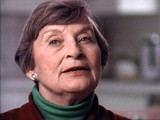You searched for: %EC%8B%A4%EC%8B%9C%EA%B0%84%EB%B0%94%EC%B9%B4%EB%9D%BC%EC%82%AC%EC%9D%B4%ED%8A%B8%20Zx444.TOP%20%EC%BD%94%EB%93%9C%206520%20%EB%B0%94%EC%B9%B4%EB%9D%BC%20%EC%9A%A9%EC%96%B4%20%EA%B5%AD%EB%82%B4%20%EC%99%B8%EA%B5%AD%EC%9D%B8%20%EC%B9%B4%EC%A7%80%EB%85%B8%20%EC%B9%B4%EC%A7%80%EB%85%B8%EC%9D%B8%EC%B2%9C%EC%A0%90%20iEo
<< Previous | Displaying results 481-490 of 561 for "%EC%8B%A4%EC%8B%9C%EA%B0%84%EB%B0%94%EC%B9%B4%EB%9D%BC%EC%82%AC%EC%9D%B4%ED%8A%B8%20Zx444.TOP%20%EC%BD%94%EB%93%9C%206520%20%EB%B0%94%EC%B9%B4%EB%9D%BC%20%EC%9A%A9%EC%96%B4%20%EA%B5%AD%EB%82%B4%20%EC%99%B8%EA%B5%AD%EC%9D%B8%20%EC%B9%B4%EC%A7%80%EB%85%B8%20%EC%B9%B4%EC%A7%80%EB%85%B8%EC%9D%B8%EC%B2%9C%EC%A0%90%20iEo" | Next >>
-
Eva Gredinger
ID CardEva was one of three children born to Jewish parents in Vertujeni, a Bessarabian town that was 90 percent Jewish. Eva attended a public school. Her family was religious, attending synagogue every day. Eva's father made his living as a kosher butcher, preparing chicken according to Jewish dietary laws. 1933-39: In 1936, when Eva was 15 years old, her family moved to Vysoka, where she later got a job as a seamstress. Vysoka was very different from her hometown. There were only about 15 Jewish families in…
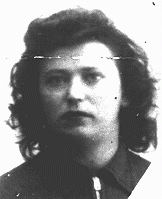
-
Janusz Piotrowski
ID CardJanusz was the eldest of four children born to Catholic parents in Plock, a town located in a rural area north of Warsaw. His father was an accountant. Janusz attended local schools, and became active in scouting. 1933-39: Janusz went to Warsaw to study civil engineering. On September 1, 1939, the Germans began bombing Warsaw. One week later, all able-bodied men who had not been mobilized were directed to retreat east. On September 17, Janusz was 90 miles from the Romanian border. That night, the Soviets…
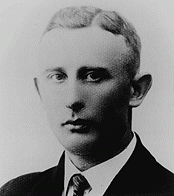
-
Tomasz (Toivi) Blatt
ID CardTomasz was born to a Jewish family in Izbica, a Polish town whose largely religious Jewish community comprised more than 90 percent of the population. Tomasz's father owned a liquor store. 1933-39: In September 1939, a drum sounded in the marketplace, calling the town to assemble for a news report. Germany had invaded Poland. More news arrived shortly; the Soviet Union was invading from the east. Tomasz and his family didn't know what to do. Some people said to run to the Soviet side; many, including his…
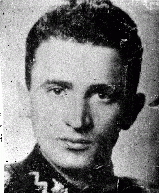
-
William Denson describes postwar trials of concentration camp personnel
Oral HistoryWilliam Denson graduated from the US Military Academy at West Point in 1934 and attended Harvard Law School. He returned to West Point to teach law from 1942 until 1945. In January 1945, Denson accepted the position of Judge Advocate General (JAG) in Europe and was assigned to US Third Army headquarters in Germany. He took part in more than 90 trials against Germans who had committed atrocities against downed American pilots. In August 1945, Denson became chief prosecutor for the US government at the…
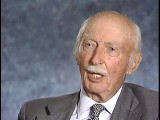
-
William Denson describes counsel provided to accused war criminals
Oral HistoryWilliam Denson graduated from the US Military Academy at West Point in 1934 and attended Harvard Law School. He returned to West Point to teach law from 1942 until 1945. In January 1945, Denson accepted the position of Judge Advocate General (JAG) in Europe and was assigned to US Third Army headquarters in Germany. He took part in more than 90 trials against Germans who had committed atrocities against downed American pilots. In August 1945, Denson became chief prosecutor for the US government at the…
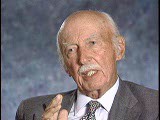
-
William Denson describes finding witnesses for the postwar trials of concentration camp personnel
Oral HistoryWilliam Denson graduated from the US Military Academy at West Point in 1934 and attended Harvard Law School. He returned to West Point to teach law from 1942 until 1945. In January 1945, Denson accepted the position of Judge Advocate General (JAG) in Europe and was assigned to US Third Army headquarters in Germany. He took part in more than 90 trials against Germans who had committed atrocities against downed American pilots. In August 1945, Denson became chief prosecutor for the US government at the…
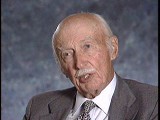
-
The Search for Perpetrators
ArticleThousands of Nazi criminals were never arrested. Learn more about the postwar efforts to bring Nazi perpetrators to justice.
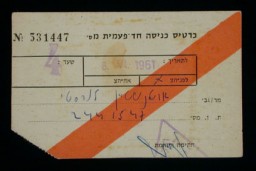
-
Westerbork
ArticleThe Westerbork transit camp, located in the German-occupied Netherlands, served as a temporary collection point for Jews in the Netherlands before deportation.
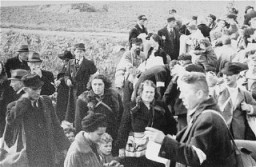
-
Felix Horn describes a hiding place in Warsaw
Oral HistoryFelix was born to an assimilated Jewish family in Lublin, Poland. His father was a locksmith and his mother was a singer. Following the German invasion of Poland on September 1, 1939, Felix fled east to Rovno and then to Soviet-occupied Lvov, where he was accepted at a medical school. After the German invasion of the Soviet Union in June 1941, Felix was taken to a labor camp. He escaped and returned to Lublin, and found that his family had been forced into the ghetto established there. After the…
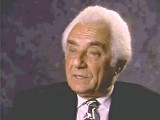
-
Selma (Wijnberg) Engel describes deportation to Sobibor
Oral HistorySelma was the youngest of four children born to Jewish parents. When she was 7, Selma and her family moved to the town of Zwolle where her parents ran a small hotel. When the Germans invaded the Netherlands in 1940, they confiscated the hotel. The family had to live in a poor Jewish section of the town. Selma went into hiding but was betrayed and then sent to the Westerbork camp. In April 1943 she was deported to Sobibor, where she worked in the clothes sorting area. There, the prisoners tried to pocket…
